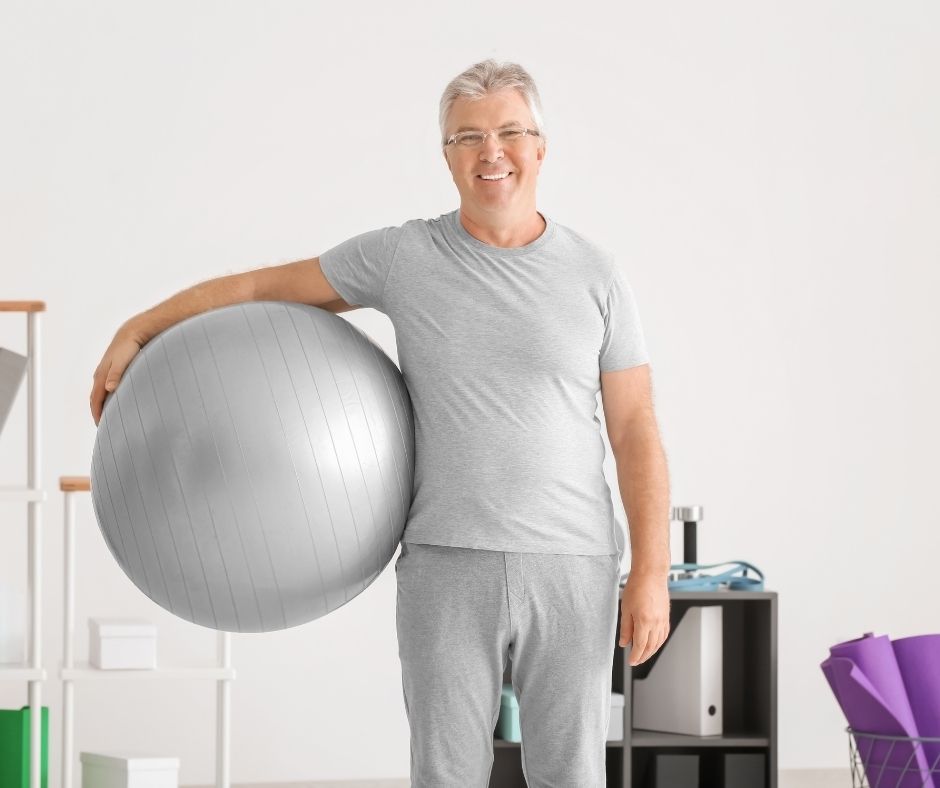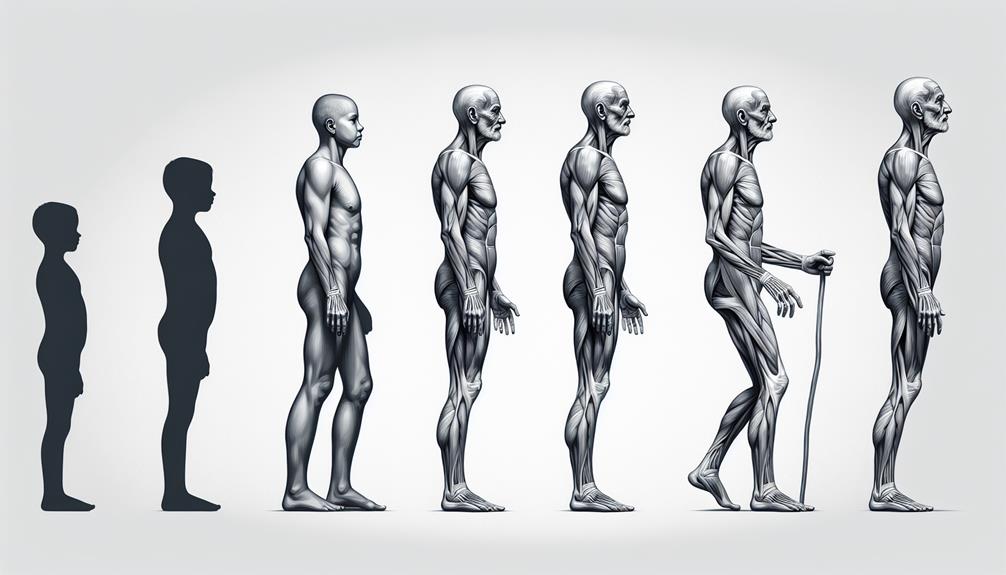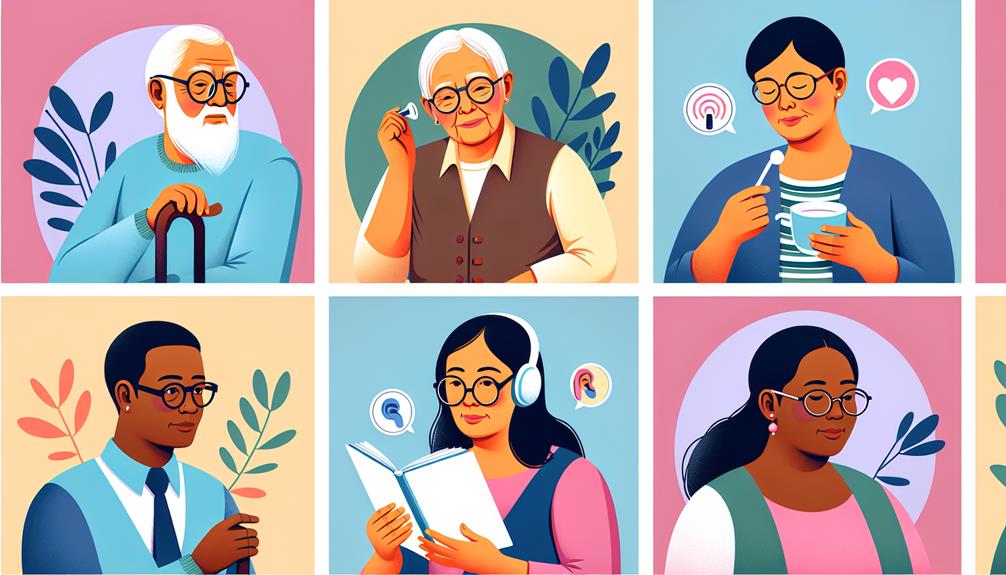
As you age, your hearing may decline starting with high-frequency sounds. Presbycusis, known for affecting older individuals, progresses gradually and can impact conversations. Seek help from an audiologist; hearing aids or implants are common solutions. Aging also affects how you process auditory information, making it hard to distinguish speech from background noise or understand rapid speech. Changes in vision can affect color perception, depth perception, and near vision focus. Regular eye exams are crucial for managing conditions like cataracts. Protect your hearing by being mindful of noise exposure and maintain healthy vision with eye exercises and nutrients. Understanding these changes is crucial for your well-being.
Key Takeaways
- Aging leads to high-frequency hearing loss, impacting conversations.
- Cognitive decline affects auditory processing and speech recognition.
- Changes in eyes cause visual acuity decline and color perception alterations.
- Depth perception changes affect tasks like driving and spatial judgment.
- Prevent hearing loss by avoiding loud noises and maintain healthy vision with eye exercises and checkups.
Age-Related Hearing Loss
Age-related hearing loss commonly begins with high-frequency sounds becoming difficult to hear clearly. This type of hearing loss, known as presbycusis, often affects individuals as they age. Presbycusis is typically gradual, starting with struggles to hear sounds like birds chirping or doorbells ringing. As this condition progresses, it can impact conversations, especially in noisy environments. If you experience these difficulties, seeking help from an audiologist is crucial.
When addressing age-related hearing loss, hearing aids are a common and effective solution. These devices amplify sounds, making it easier for individuals to hear and communicate. Modern hearing aids come in various styles, including behind-the-ear and in-the-ear options, catering to different preferences and levels of hearing loss.
For individuals with severe hearing loss that can't be sufficiently helped by hearing aids, cochlear implants may be recommended. Cochlear implants are surgically implanted devices that directly stimulate the auditory nerve, bypassing damaged parts of the inner ear. This technology can significantly improve hearing abilities in those who are eligible for the procedure.
Changes in Auditory Processing
Amid the natural progression of aging, changes in auditory processing can significantly impact how sound information is interpreted by the brain. As individuals age, cognitive decline may affect the brain's ability to process auditory information efficiently. This decline can lead to difficulties in distinguishing speech from background noise, understanding rapid speech, and localizing sounds in space.
The brain's function in processing auditory stimuli may also be affected by changes in hearing sensitivity that commonly occur with age. These alterations can result in decreased auditory processing speed and accuracy.

Furthermore, age-related changes in auditory processing can impact an individual's ability to comprehend conversations, leading to social isolation and communication challenges. Research suggests that older adults may experience difficulties in filtering out irrelevant information, making it harder to focus on essential auditory cues. Understanding how cognitive decline and changes in brain function affect auditory processing is crucial in developing strategies to improve communication and quality of life for older individuals.
Impact on Speech Recognition
How does aging impact your ability to recognize speech accurately and efficiently?
As you age, cognitive decline can affect speech comprehension by slowing down the processing of auditory information. This can lead to difficulties in understanding conversations, especially in noisy environments. Additionally, memory plays a crucial role in speech recognition, and with age, there may be challenges in recalling information heard during a conversation, further impacting speech comprehension.
Hearing impairment is another common issue associated with aging that can significantly impact speech recognition. Age-related hearing loss, known as presbycusis, can make it harder to distinguish speech sounds, especially in situations where multiple people are speaking simultaneously or where there's background noise.
To mitigate the effects of aging on speech recognition, it's essential to address any hearing loss through regular check-ups and the use of hearing aids if needed. Cognitive exercises and strategies to improve memory can also be beneficial in enhancing speech comprehension as you age.
Decline in Visual Acuity
With advancing years, changes in the eyes' ability to focus on near objects can lead to a decline in visual acuity. This decline is often a result of common age-related eye conditions such as macular degeneration and cataracts.

Macular degeneration affects the central part of the retina, leading to a loss of central vision. Cataracts cause clouding of the eye's lens, resulting in blurred vision.
Additionally, presbyopia, a condition where the eye's lens stiffens, makes it difficult to focus on close objects, impacting near vision. Astigmatism, another common issue, occurs when the cornea or lens is irregularly shaped, causing distorted vision at all distances.
These conditions can contribute to a gradual deterioration in visual acuity as you age. Regular eye exams are crucial for early detection and management of these issues, helping to preserve your vision and quality of life as you navigate the changes that come with aging.
Effects on Color Perception
As you age, changes in your eyes' ability to perceive colors may occur due to alterations in the structure of the eye and the functioning of the retina. Color discrimination, aging, and vision changes in the elderly are common phenomena that can impact daily life. The aging process affects the eye's lens, making it less transparent and reducing the amount of light that reaches the retina. Additionally, the cells in the retina responsible for color perception may decrease in number or function less effectively over time.
| Effects on Color Perception | |||
|---|---|---|---|
| Change | Description | Impact | Management |
| Color Discrimination | Aging can lead to difficulty distinguishing between certain shades, especially in the blue-violet range. | This can affect tasks like reading color-coded information or driving. | Regular eye exams can help detect color vision changes early. Consider using contrasting colors for better visibility. |
| Reduced Color Sensitivity | The ability to perceive subtle differences in colors may diminish with age. | It may lead to challenges in activities that require color accuracy, such as cooking or selecting clothing. | Using brighter lighting and labeling items with contrasting colors can aid in maintaining color perception. |
Understanding these changes and implementing strategies to manage them can help maintain independence and quality of life as you age.
Altered Depth Perception
Changes in your depth perception can occur as you age, impacting your ability to accurately judge distances and spatial relationships. As you grow older, you may experience challenges in depth perception, leading to difficulties in tasks such as driving, navigating stairs, or reaching for objects. These changes can be attributed to various factors, including alterations in eye structure, decreased visual acuity, and changes in the brain's processing of visual information.

One common issue associated with altered depth perception is experiencing visual distortions. These distortions can manifest as difficulties in perceiving the relative distances of objects, causing objects to appear closer or farther away than they actually are. This can result in misjudging steps, bumping into objects, or having trouble parking a car accurately.
It is essential to be aware of these depth perception challenges and take appropriate measures to compensate for them. Regular eye examinations, maintaining proper lighting in your environment, and using aids such as glasses or contact lenses can help mitigate the impact of altered depth perception on your daily activities. By staying proactive and seeking assistance when needed, you can navigate the effects of aging on your depth perception more effectively.
Strategies for Hearing Preservation
Implementing proactive measures is crucial for preserving your hearing as you age. Preventive measures play a significant role in maintaining good hearing health over time. One of the most important strategies for hearing preservation is to use hearing protection in loud environments. Whether you're at a concert, working with machinery, or in any situation with high noise levels, wearing earplugs or earmuffs can help prevent damage to your hearing.
Additionally, it's important to limit exposure to loud noises whenever possible. Being mindful of the volume when listening to music through headphones or in the car can make a big difference in the long run. Regularly checking the noise levels in your environment and taking breaks from loud sounds can also help reduce the risk of hearing loss.
Incorporating these preventive measures into your daily routine can go a long way in protecting your hearing as you age. Remember, hearing protection is key to preserving your ability to enjoy all the sounds life has to offer.
Tips for Maintaining Healthy Vision
To maintain healthy vision as you age, incorporating good eye care habits into your daily routine is essential. Start by including eye exercises in your schedule to strengthen eye muscles and improve focus. These exercises can include focusing on distant and nearby objects, as well as rolling your eyes in different directions.

Additionally, ensuring your diet includes nutrients like vitamin A, C, E, and omega-3 fatty acids can support eye health. Regular checkups with an eye care professional are crucial for detecting any early signs of vision problems and ensuring timely intervention.
Protecting your eyes from harmful UV rays by wearing sunglasses that block UVA and UVB rays is vital in preventing conditions like cataracts and macular degeneration. Remember, maintaining healthy vision is a combination of proactive care and lifestyle choices. By prioritizing eye health through these tips, you can help preserve your vision as you age.
Conclusion
As you age, it's important to be aware of the changes that can occur in your hearing and vision. From age-related hearing loss to declines in visual acuity, these changes can impact your day-to-day life.
By understanding how aging affects your hearing and vision, you can take proactive steps to preserve these senses.
Remember, taking care of your hearing and vision now can help you enjoy a clearer and more vibrant future.



